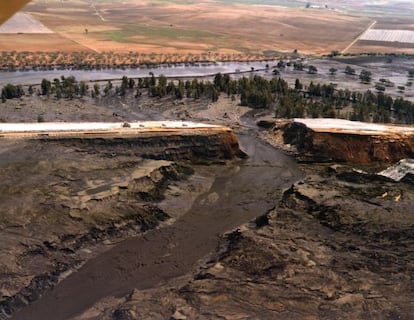Letting polluters off the hook
Potentially contaminating businesses had to take out insurance to cover cleanup costs But a new reform will let 98 percent of firms opt out


They called it "green insurance," and it was one of the most ambitious environmental laws passed by the previous Socialist administration. In 2007, tens of thousands of potentially contaminating businesses were forced to take out guarantees to cover the cleanup costs of any accident that might result from their activities.
Essentially, it was about putting into practice the "polluter pays" principle. A company took out a financial guarantee on the basis of its own capacity for damaging the environment in the event of a mishap. Under the 2007 law, as many as 320,000 business operators were required to have this form of financial cover.
Everyone still had in mind the 1998 spill at a mine in Aznalcóllar, Seville province, which caused a huge environmental disaster near Doñana National Park, home to the endangered Iberian lynx (see sidebar). But a reform undertaken by the current Popular Party (PP) administration will release 98 percent of these businesses from the obligation to take out green insurance. As a result, only 5,470 companies will still be required to do so.
The fact is, the 2007 legislation was so ambitious that the financial guarantees were never effectively implemented, bogged down as they were by regulatory development. Ministerial orders were issued extending the deadlines for implementation, so that the green insurance "was never actually demanded," notes Rita Rodríguez, a lawyer for the non-profit World Wildlife Fund (WWF).
“Serious deficiencies” in the law
A deposit of toxic sludge inside a mine outside Aznalcóllar burst in 1998, causing an environmental disaster near the Doñana National Park wetlands. The owner of the mine, a Swedish company named Boliden, declared itself bankrupt and the Spanish state was forced to pick up the 89-million-euro tab for the cleanup services. In another case, a company called Erkimia spilled 700,000 cubic meters of toxic waste into the Ebro river over the course of several years. The waste accumulated at the bottom of a reservoir in Flix, Tarragona province, and cleaning that up will cost the state 165 million euros.
"The weakness of our laws in preventing the impunity of environmental disasters is evident," notes the Socialist Party's environment spokesman, Hugo Morán. A State Council report on the government's planned reform of environmental legislation also talks about "defects" and says that "it is possible to assert that the Spanish laws still lack a system that minimally guarantees the prevention, avoidance and reparation of damage to the environment."
The text adds that Spanish laws, unlike European ones, still fail to understand that the polluter pays principle "is not a system to find guilty parties but a rule for objective responsibility."
The Environment Ministry claims that it has exempted businesses "with a low potential for generating environmental damage and with a low accident rate." Cement plants, chemical plants, nuclear power stations and other high-risk operators will still need this kind of coverage.
But the fact that nearly 315,000 companies have been left out of the green insurance requirement has come to the attention of the State Council. In a statement dated December 19, to which EL PAÍS has had access, this body says that "such a generalized exemption should, in the view of the State Council, be better integrated into the present bill." Hugo Morán, the Socialist Party's environmental spokesman, explains that the council "is criticizing the fact that there is practically a generalized exception; that is to say, the exception has become the rule."
"The new law reduces to a bare minimum the activities that are subject to the guarantee. And the few that still fall within this category will take it out on a voluntary basis, not by obligation," adds Morán.
The Socialist spokesman is talking about another new item in the reform: whereas it used to be the government who decided each company's degree of responsibility, now it will be the operator who determines the amount of coverage it needs based on a risk analysis.
"It's like turning the polluter pays principle into a voluntary option," says Mario Rodríguez, director of Greenpeace Spain. "If an insurance policy was taken out, you are sure that the party responsible for, say, a spillage, will pay for the damages. If there is no insurance, you have to go to the courts to demand this payment. In the end, what this reform means is that the environmental groups will have to spend our money going to court to demand reparation following an accident. And experience shows that, in the absence of a guarantee, nobody pays. [...] This reform sounds like an undercover amnesty for most companies."
Guillermina Yanguas, head of the government's Environmental Quality and Evaluation Office, says that "Spain took a courageous step" in 2007 when it demanded financial guarantees from businesses. The law was a national application of a European directive that gave member states the freedom to decide whether to force companies to take out green policies or not. "The Socialist government realized that the demand was excessive," she says, adding that a cement plant or a chemical plant is not the same as an auto body shop or a dry cleaner's.
What the ministry wants, she says, is for the 5,470 operators to set up their financial cover "in June of this year." Regarding the amounts, she says that "it is in the operator's best interests to cover all the damage it might produce." As for the fact that it is voluntary, "this will not prevent the government from reviewing it."
But Rita Rodríguez, of WWF, is concerned that "everything is left in the hands of the operator, which assesses its own risks and decides how much insurance to take out. Is that going to be reviewed later? And it's not so clear that a small or midsized company cannot do much damage."
Mario Rodríguez of Greenpeace Spain has similar concerns. "Say a workshop has a used oil tank that cracks and the oil spills into the sewage system. Before this, when there was a spill, an insurance company paid for the damage. But now what?"
Tu suscripción se está usando en otro dispositivo
¿Quieres añadir otro usuario a tu suscripción?
Si continúas leyendo en este dispositivo, no se podrá leer en el otro.
FlechaTu suscripción se está usando en otro dispositivo y solo puedes acceder a EL PAÍS desde un dispositivo a la vez.
Si quieres compartir tu cuenta, cambia tu suscripción a la modalidad Premium, así podrás añadir otro usuario. Cada uno accederá con su propia cuenta de email, lo que os permitirá personalizar vuestra experiencia en EL PAÍS.
¿Tienes una suscripción de empresa? Accede aquí para contratar más cuentas.
En el caso de no saber quién está usando tu cuenta, te recomendamos cambiar tu contraseña aquí.
Si decides continuar compartiendo tu cuenta, este mensaje se mostrará en tu dispositivo y en el de la otra persona que está usando tu cuenta de forma indefinida, afectando a tu experiencia de lectura. Puedes consultar aquí los términos y condiciones de la suscripción digital.








































